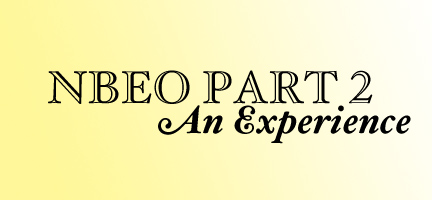BOARDS. At first blush, this word tends to illicit anxiety among OD students. Rightfully so, as these exams determine the outcome for our licenses and residencies. We spend countless hours studying, reviewing, creating mnemonics, all in the hopes that we’ve covered enough material to pass the exam. Having completed NBEO 2 in recent days, let me reassure you of what lies ahead.
NBEO Part 2 is a test of your skills as a problem-solver; these skills as a diagnostician are your most crucial and important. You will be solving anatomical, physiological, optical, pathological, and refractive problems every day in a clinical setting. Some may be minor, and some can be major, and it is your job as a medical health professional to diagnose what plagues your patient.
There are countless stories as to how ODs have saved their patients’ lives because they are knowledgeable diagnosticians. NBEO 2 will present a patient to you (much like you would see in your office), combined with data, pictures, and varied other test results. You, as the doctor, will determine the cause of chief and secondary complaints and possibly treat this condition based on your extensive knowledge. Yes, your knowledge IS extensive!
Preparation for the exam varies among individuals. Recognize your strengths and weaknesses and focus on the topics that are most difficult for you to understand. If you are unsure about those, speak to your professors and attending clinicians, as they can help you better determine what you may need to focus on. Again, this is an important exam, so give yourself ample time to review, and most importantly UNDERSTAND the topics that NBEO outlines. Understand treatment modalities as well and keep yourself updated with the latest options available for your patients.
Unsure where to start? Have no fear, as resources are all around you! Of course, your didactic class notes will serve you well since they most likely are the most concentrated and detail oriented source you already have. Also, The Wills Eye Manual (Lippincott, Williams & Wilkins), The Massachusetts Eye and Ear Infirmary Illustrated Manual of Ophthalmology (Saunders), and Clinical Diagnosis in Ophthalmology by Dr. Jack Kanski (Mosby) are excellent resources for diagnosis, differentials, treatment, and photographs. Also, there are review programs such as OptoPrep and KMK that for a fee, will provide you with study materials.
Be sure to create a schedule and prioritize. Also, be realistic about the time you can and need to devote to the process of review. Organize your class notes and review materials in order to better focus on the daily task at hand. Lastly, stay positive! You know the subject matter and have been tested on the skills necessary to dominate this exam! Be encouraged, and keep the ultimate goal of a successful result in mind each time you study. Take mental breaks to process and internalize the material you just studied and if you need help, ASK! You can and will perform well on your NBEO exams! Best wishes for your continued success!


